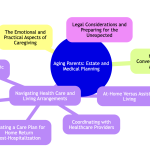Introduction - Starting the Conversation
Families with aging parents can significantly benefit from having conversations on estate and medical planning.
Properly managing health care for older adults often involves planning - both estate planning and financial planning.
Discussing wills, power of attorney, and healthcare directives early is essential to avoid future uncertainties. Active planning aligns family expectations and secures a sense of preparedness, reducing stress for all involved.
- This article comes from the caring attorneys at Montana Elder Law - serving our Montana communities and improving lives with solid legal expertise.
Key Takeaways
- Initiate health and estate planning discussions early.
- Regularly update and review all essential legal documents.
- Learn the roles and responsibilities tied to medical power of attorney and advance directives.
- Prioritize caregiver well-being alongside care responsibilities.
- Develop an in-depth plan for aging in place or transitioning to care facilities.
The Foundation of Estate Planning for Aging Parents
Estate planning is a comprehensive approach that includes preparing wills, establishing trusts, and designating powers of attorney.
Wills specify asset distribution, trusts offer asset management and protection, and powers of attorney authorize someone to make financial and healthcare decisions when necessary.
Legal tools like these are fundamental in avoiding potential disputes and ensuring intentions are clearly communicated and executed.
Understanding Medical Directives and Powers of Attorney
Medical directives and powers of attorney are important legal documents that guide healthcare decisions when one cannot make those decisions themselves.
- Advance Directives: Documents that outline treatment preferences by providing clear instructions to healthcare providers - relieving family members from making those tough decisions.
- Healthcare Proxy: Assigns a trusted individual the responsibility to make healthcare decisions.
- Medical Power of Attorney: Broadens the scope, allowing the designated person to make a wide range of health-related decisions on behalf of the patient.
Senior Health Care and Living Arrangements
Coordinating with Healthcare Providers
Stay on top of your schedule by using calendars (physical or digital) or apps like MyChart or Medisafe to manage appointments and medication schedules efficiently.
These tools can alert you to upcoming appointments and when to take medications, plus they offer a secure way to share vital health information directly with healthcare providers.
At-Home Versus Assisted Living
- Assessing Needs: When choosing between home and assisted living, consider mobility, cognitive health, and assistance with daily living activities.
- Tools like the AARP HomeFit Guide can help evaluate how well your current home can be adapted for aging in place.
- For assisted living, consult resources like the Assisted Living Federation of America for facility ratings and reviews.
The Role of a Geriatric Care Manager
- Finding the Right Fit: Geriatric Care Managers (GCMs) can be found through the Aging Life Care Association, which certifies professionals adept at assessing needs and coordinating care. They are instrumental in navigating healthcare systems, evaluating care options, and facilitating communication among family members.
Creating a Care Plan for Home Return Post-Hospitalization
- Comprehensive Checklist: Include home modifications for safety (grab bars, non-slip mats), a detailed medication regimen, and a schedule for follow-up medical appointments.
- Services like CaringBridge can help organize caregiving tasks among family members and friends.
Financial Planning for Healthcare Needs
Understanding Medicare and Medicaid
Educate Yourself: Use resources like Medicare.gov and Medicaid.gov to understand the coverage, benefits, and eligibility requirements.
Consider consulting a financial advisor specializing in eldercare to explore long-term care insurance options and how they fit into your overall financial strategy.
Legal Considerations and Preparing for the Unexpected
Organized Document Management
Utilize a digital document storage service or a well-organized filing system to keep critical legal documents accessible.
Include contact information for your elder law attorney, healthcare proxy, and any other key individuals involved in your care planning.
If professional services are not an option, websites like LegalZoom or Nolo can provide templates and guidance for drafting essential documents.
Table: Essential Legal Documents and Their Purposes
|
Document |
Purpose |
|
Wills |
Directs how assets are distributed among beneficiaries after death. |
|
Powers of Attorney |
Grants a designated individual the authority to make financial, legal, and other decisions on one’s behalf. |
|
Healthcare Directives |
Outlines the medical treatments one prefers or wishes to avoid, and appoints a healthcare proxy to make decisions if one is incapacitated. |
The Emotional and Practical Aspects of Caregiving
Caring for aging parents is a rollercoaster of emotions, balancing love, duty, and often, stress. It's a marathon, not a sprint. Remember, self-care isn't selfish; it's essential. Keeping your tank full ensures you can be there for them without burning out.
- Acknowledge Your Feelings: It's okay to feel overwhelmed.
- Set Boundaries: Know your limits.
- Seek Support: Lean on friends, family, or caregiver support groups.
- Practice Self-care: Keep up with your hobbies and health.
- Educate Yourself: Knowledge is power, and understanding available resources can ease anxiety.
Effective Communication Techniques vs. Common Pitfalls
When discussing estate and medical planning with aging parents, how you communicate is as crucial as the conversation itself. Effective communication fosters understanding and cooperation, while common pitfalls can hinder progress.
Open-ended Questions
- Encourage Sharing: Ask questions that require more than a yes or no answer to encourage deeper discussion. For example, "How do you feel about creating a living will?"
Listening
- Value Their Thoughts: Active listening shows respect for their opinions. Repeat back what you've heard to ensure you've understood correctly.
Patience
- Allow Time to Process: Complex topics require time to digest. Be patient and avoid pushing for immediate decisions.
Avoid Confrontation
- Maintains Open Lines: Approach discussions with understanding, not aggression, to keep communication lines open.
Avoid Assumptions
- Clarify, Don't Assume: Never presume to know their wishes without asking directly. Misunderstandings can complicate planning.
Avoid Rushing
- Respect the Need for Time: Important decisions, especially about estate and medical planning, should not be rushed. Allow time for consideration and consultation with professionals if needed.
Parting Words - Your Trusted Elder Law Attorneys
Engaging in discussions and plans regarding the estate and medical care of aging parents is a significant expression of love and responsibility.
It prioritizes their dignity and well-being. Knowing that their desires and needs are respected will strengthen your family and take less weight off your shoulders.
Montana Elder Law is an experienced attorney's office that provides families with the guidance and expertise needed to navigate these sensitive matters. Their professionalism and compassion deliver peace of mind for families, making the complex planning process for the future a smoother and more assured journey for all involved.







